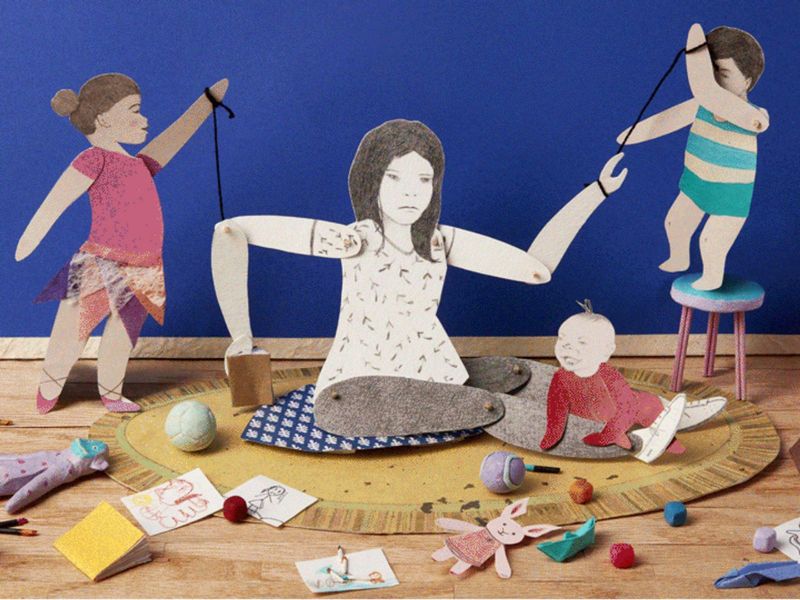17 Signs You’re Unknowingly Putting Pressure On Your Child

Parenting is a journey filled with love and challenges, where our intentions are often clouded by our own experiences and expectations.
Sometimes, without realizing it, we may place undue pressure on our children.
This gentle guide explores 17 subtle ways we might unknowingly burden our children, encouraging reflection and positive change.
1. Constantly comparing them to siblings or peers

Comparisons can feel like harmless motivation, yet they often sow seeds of inadequacy. When a child is frequently measured against their siblings or classmates, it can foster a sense of competition rather than cooperation.
The pressure to outperform can overshadow personal growth and uniqueness. Imagine a child joyfully showing off their latest art project, only to be met with a parent’s comment about someone else’s achievements.
Such moments, though subtle, can lead to feelings of not being good enough. Parents may intend to inspire, but the underlying message received is often one of unworthiness. Emphasizing individual milestones and celebrating personal progress can nurture confidence and independence. Shifting focus from comparison to personal achievement turns the parenting lens towards encouragement and understanding.
2. Over-scheduling their days with activities

In our fast-paced world, offering kids a variety of activities seems beneficial, aiming to give them a competitive edge. However, an overcrowded schedule can lead to burnout and stress, eclipsing the joy of childhood.
Picture a young child racing from piano lessons to soccer practice, barely having time to breathe or reflect. This hustle can stifle creativity and self-discovery, as there’s little room left for spontaneity. While structured activities are valuable, balance is key. Allowing days for free play or relaxation fosters imagination and personal growth.
Encouraging children to choose activities they genuinely enjoy can spark passion rather than pressure. A more relaxed approach helps them find joy in their pursuits, cultivating a love for learning without the strain of overcommitment.
3. Reacting strongly to minor mistakes

Mistakes are vital stepping stones to learning, yet a strong reaction can make them seem catastrophic. When a child accidentally spills milk and is met with visible frustration, they may start fearing failure. This fear can inhibit them from trying new things, stunting their growth.
Creating an environment where mistakes are seen as opportunities rather than failures encourages resilience. A gentle acknowledgment paired with guidance on how to rectify the error can transform the incident into a valuable lesson.
The focus shifts from what went wrong to what can be learned. Celebrating efforts rather than outcomes instills a growth mindset, allowing children to embrace challenges with confidence.
4. Expecting perfection in academics or sports

The quest for excellence can inadvertently translate into a demand for perfection. A child might bring home a report card, proud of their hard-earned A’s, only to have a parent focus on the singular B. Such focus can overshadow the celebration of success and instill a belief that nothing less than perfect is acceptable.
This pressure can manifest as anxiety and fear of letting their parents down. Encouraging effort, growth, and the joy of learning can alleviate this pressure.
Recognizing hard work and improvements rather than just the end result fosters a healthier attitude towards education and personal development. Children thrive in environments where they feel supported and understood, not judged by their grades alone.
5. Dismissing their feelings as overreactions

Children’s emotions can be intense and fleeting, yet dismissing them as mere overreactions can be damaging. When a child’s feelings are minimized, it sends a message that their emotions are invalid. This can lead to confusion and difficulty in processing future feelings.
Imagine a child expressing sadness over a lost toy, only to be told they’re overreacting. Such dismissal can build emotional walls and hinder communication. Recognizing and validating emotions, no matter how small they seem, teaches empathy and understanding.
Encouraging open conversations about feelings fosters emotional intelligence and trust. It helps children learn to navigate their emotional world with confidence and clarity.
6. Making success a condition for praise

Praise tied solely to success can feel conditional and insincere. A child might win a race and earn a parent’s approval, but without a win, the praise may vanish. This creates an association between love and achievement, rather than effort and perseverance.
When children believe they must succeed to earn praise, it can lead to anxiety and fear of failure. Celebrating the effort and journey, rather than just the outcome, fosters a resilient spirit. Encouraging children to pursue passions for enjoyment, not solely for accolades, nurtures intrinsic motivation.
By appreciating the effort, parents can cultivate a supportive atmosphere where children feel valued for who they are, not just what they achieve.
7. Projecting your own unfulfilled dreams onto them

Parents often harbor dreams for their children, but projecting personal unfulfilled aspirations can become burdensome. A parent might hand their child a sports jersey, hoping they’ll embrace the sport they once loved, without considering the child’s interests.
The child, feeling obligated to pursue these dreams, may end up pursuing paths that don’t resonate with their true selves. Encouraging exploration of their own interests, rather than imposing parental desires, fosters authentic growth.
Recognizing and supporting a child’s unique passions nurtures confidence and individuality. By allowing children the freedom to choose their paths, parents help them cultivate a sense of self-worth and happiness, free from the weight of inherited dreams.
8. Using guilt to motivate behavior

Guilt can be a powerful motivator, but it often leaves lasting emotional scars. A parent might say, “After all I’ve done for you,” in hopes of prompting a certain behavior. This approach can lead the child to act out of obligation rather than genuine desire.
Guilt-driven actions erode intrinsic motivation and can damage the parent-child relationship over time. Fostering an environment where actions are driven by understanding and mutual respect rather than guilt cultivates a healthier dynamic.
Encouraging open dialogue and explaining the reasons behind requests can lead to more willing cooperation. This approach helps children learn decision-making based on values and empathy rather than fear or obligation.
9. Ignoring signs of burnout or stress

In the hustle of daily life, stress and burnout can easily go unnoticed. A teenager might juggle school, sports, and social obligations, showing signs of fatigue, yet a parent might overlook these signals. Ignoring these signs can lead to long-term emotional and physical consequences.
Creating a safe space for children to express their feelings without fear of judgment is crucial. Recognizing the signs of stress and taking action can prevent burnout and ensure a balanced lifestyle.
Encouraging regular breaks and downtime promotes mental and physical well-being. Acknowledging a child’s need for rest and relaxation fosters a supportive environment where they can thrive without feeling overwhelmed.
10. Prioritizing achievements over effort

When achievements overshadow effort, it can send a message that results are all that matter. A child might notice their parent’s excitement only when they bring home medals, rather than acknowledging their hard work and perseverance.
This focus can create a fear of not being good enough unless they win or excel. Celebrating the effort, dedication, and improvements cultivates a growth mindset and resilience. It teaches children that the journey, with its ups and downs, is valuable.
Encouraging persistence and a love for learning, regardless of the outcome, helps children develop a healthy relationship with success and failure. It nurtures a belief that effort is as commendable as achievement itself.
11. Setting unrealistic expectations

Setting high expectations can motivate, but unrealistic ones can feel suffocating. A child might bring home a report card that reflects their best efforts, only to face a parent’s list of lofty expectations. This disconnect can lead to stress and diminished self-esteem as they struggle to meet unattainable standards.
Encouraging realistic goals and celebrating progress, however small, fosters a sense of accomplishment and self-worth. Supporting children as they navigate their own paths, rather than imposing rigid expectations, cultivates a nurturing environment.
It teaches them that striving for personal bests, not perfection, is what truly matters. This approach builds confidence and resilience, preparing them for life’s challenges.
12. Minimizing their interests if they differ from yours

A child excitedly shares their latest bug collection only to be met with a parent’s disinterest because it doesn’t align with their own hobbies. Such reactions can stifle curiosity and discourage exploration of personal interests.
When a child’s passions are dismissed, it sends a message that they are unimportant, leading to self-doubt. Embracing and encouraging diverse interests fosters creativity and self-expression. By showing genuine interest and support, parents can help children build confidence and a strong sense of identity.
Celebrating what makes them unique, even if it differs from familial norms, cultivates a sense of belonging and self-worth.
13. Frequently reminding them of sacrifices made for them

While it’s natural for parents to make sacrifices, constantly reminding children of these sacrifices can burden them with guilt. A parent might recount all they’ve given up, hoping to instill gratitude, but the unintended consequence is often a sense of obligation and pressure.
Children may feel like they owe success or happiness in return, overshadowing their joy with guilt. Encouraging gratitude through understanding and empathy rather than reminders builds a more genuine appreciation.
Cultivating a relationship where gratitude is mutual and not transactional fosters emotional well-being. Recognizing that parenting is a gift, not a burden, helps children grow in an atmosphere of love and respect.
14. Over-involvement in their decision-making

Being involved in a child’s life is essential, but over-involvement can stifle independence. A parent might make decisions about which friends their child should have or what hobbies to pursue, leaving the child unsure of their own choices.
This can lead to dependency and a lack of confidence in their decision-making abilities. Encouraging autonomy and respecting a child’s choices nurtures independence and self-assurance. Guiding rather than dictating allows children to learn from their experiences and develop critical thinking.
By stepping back and allowing them room to grow, parents foster resilience and confidence, preparing them for adulthood.
15. Equating their worth with accomplishments

When a child’s worth is tied to accomplishments, it can create a fragile sense of self-esteem. A parent might only express pride when their child brings home a trophy, leaving the child to wonder if they are valued only for their achievements.
This can result in anxiety and fear of failing to meet expectations. Valuing effort, character, and personal growth over tangible successes helps build a stable foundation of self-worth.
Encouraging children to explore various interests without the pressure to excel in everything cultivates a love for learning and self-discovery. It teaches them that their value is inherent and not defined by accomplishments alone.
16. Displaying disappointment over setbacks

Setbacks are natural, yet displaying disappointment can amplify their impact. A child might try their best at a school play, only to notice a parent’s disappointment when they forget a line. Such reactions can discourage trying new things and diminish self-esteem.
Embracing setbacks as part of the learning journey encourages resilience and growth. Offering support and understanding helps children navigate their emotions and learn from experiences
By focusing on the effort and courage it takes to try, rather than the outcome, parents can instill a mindset of perseverance and optimism. This nurturing approach builds confidence, encouraging children to embrace challenges.
17. Neglecting to celebrate their unique qualities

Every child possesses unique qualities that deserve celebration, yet these can be overlooked in the pursuit of conventional success. A child might create a beautiful piece of artwork, only for a parent to focus on grades instead.
This can lead to feelings of invisibility and undervaluation. Celebrating individuality and the diverse talents each child brings fosters a sense of worth and belonging. Encouraging diverse expressions of creativity and acknowledging non-traditional strengths helps build a well-rounded sense of self.
It nurtures an environment where children feel seen and appreciated for who they are, beyond conventional achievements.
